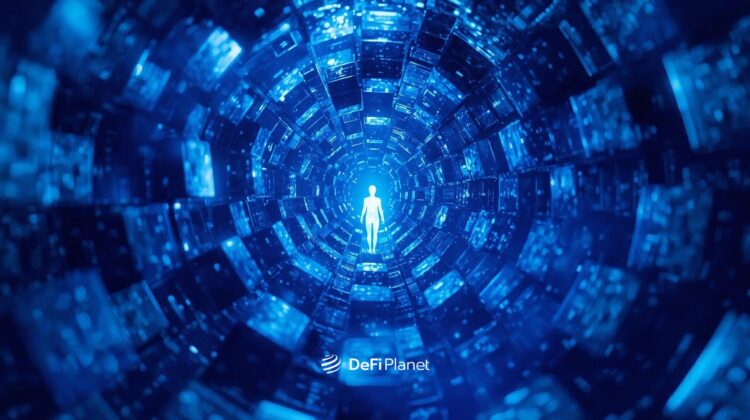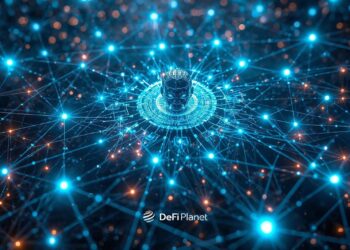The internet has changed the world in big ways. At first, it helped us send information, like emails, websites, and videos, across the globe. But now, something new is happening, and with the rise of blockchain and Web3, we’re entering a second phase of the internet. This new phase isn’t just about sharing information; it’s about sharing value, like money, digital ownership, and personal identity, through powerful smart networks that don’t need big companies in control.
This shift opens up deep questions: questions about who we are online, what it means to have freedom in the digital world, and how we find meaning in a space run by code rather than people. These are the same kinds of questions that philosophers like Søren Kierkegaard and Friedrich Nietzsche asked long ago, except now, we’re asking them about things like crypto wallets, smart contracts, and decentralized apps.
In this article, we’ll explore Web3 philosophy and the ideas of existentialism and crypto, looking at how concepts like digital self-sovereignty and blockchain freedom shape our new online identities. We’ll see how Kierkegaard’s crypto struggles with anxiety and choice, and Nietzsche’s blockchain ideas about power and truth, help us understand the soul of this new digital world.
Web3 Philosophy: Decentralization and Self-Sovereignty
Web3 is a new way of using the internet where no single company or person is in charge. Instead, control is spread out across lots of computers. This is called decentralization, and it gives people more power over their own information and online lives. This idea is connected to something called digital self-sovereignty, which means you get to own and control your digital identity, like your online profile, your data, and even your digital money.
With Web3, the idea of freedom on the blockchain becomes very important. You don’t have to depend on big tech companies to handle your data or decide what you can or can’t do. Instead, the system runs on blockchain technology, which uses code and math to keep things honest and secure. Everyone can see what’s happening on the blockchain, so it’s easier to trust that things are fair.
Web3 isn’t just about interesting tech, it also makes us think about big questions. These are the kinds of questions people talk about in philosophy, like: “What does it mean to really own something online?” or “How do we make fair rules when no one is the boss?” These ideas are part of what is called Web3 philosophy.
In this new kind of internet, people have more freedom, but that also means we have to take more responsibility. We all help shape the rules, the tools, and the future. That’s why understanding these ideas now is so important. Web3 is giving us the chance to build a better internet, and it’s up to all of us to make it work in a way that’s fair and good for everyone.
Existentialism and Crypto: Embracing Freedom and Responsibility
Philosophers like Søren Kierkegaard and Friedrich Nietzsche talked a lot about what it means to be truly free, and how being free isn’t always easy. Kierkegaard came up with something called the “dizziness of freedom.” It means that when you have a lot of choices, it can feel overwhelming or even scary, but it’s also how you grow into your true self. In the world of Web3, this makes a lot of sense, and now that people can control their own data, money, and online identity, it’s exciting; but it also means they have to make smart choices and take responsibility for what they do online.
Nietzsche talked about the “will to power,” which means creating your own path and not just following rules that other people made. In Web3, this idea shows up in how people build their own communities, make their own rules, and decide what’s important to them online. Instead of letting big companies decide what you see or do, you get to help shape the internet.
So, even though these philosophers lived long before the internet, their ideas still resonate today. They help us understand the kind of freedom Web3 gives us, and remind us that with that freedom comes the responsibility to use it wisely.
Kierkegaard Crypto: Navigating Anxiety in the Digital Realm
Kierkegaard’s exploration of anxiety as a response to freedom resonates in the Web3 environment. The responsibility of managing one’s digital assets, understanding complex technologies, and making autonomous decisions can be daunting. However, embracing this anxiety can lead to personal growth and a more authentic digital existence.

In Web2, much of our digital experience is managed for us. Social media platforms store our data, banks hold our money, and tech companies make decisions on our behalf. This convenience comes at a cost: control. In contrast, Web3 gives that control back, but with it comes the burden of responsibility. Just like Kierkegaard described in his existentialist writings, freedom isn’t always comforting, it can make us nervous, unsure, even afraid. But it’s also what makes true independence possible.
When users start using decentralized tools like crypto wallets or smart contracts, they often feel lost at first. There’s no customer support line, no “forgot password” button. Mistakes can be costly. But over time, many people learn not just how the tools work, but how to trust themselves. In this way, Web3 becomes a place not just for tech innovation, but for personal development.
Nietzsche Blockchain: Creating Meaning in a Decentralized World
Nietzsche’s philosophy challenges us to find meaning in a world without inherent purpose. In the blockchain space, this translates to users building communities, creating decentralized applications, and establishing new forms of governance. By participating actively, individuals infuse the digital realm with purpose and direction.
In traditional internet systems (Web2), meaning and structure are mostly handed down from centralized platforms. Social networks decide what content matters, corporations control who gets paid, and governments dictate the rules. This is where Nietzsche’s concept of the “will to power” comes into play. It’s not about domination; it’s about self-expression and the courage to shape the world according to one’s own vision. In Web3, that might look like someone launching a DAO to fund art projects, building an open-source tool for privacy, or forming an online collective to support a cause they believe in. Each of these actions is a way of asserting values and creating meaning where there was none before.
Blockchain governance also reflects this idea, and in decentralized systems, users vote on proposals, help write rules, and determine the future of the platforms they use. There are no central leaders, just communities making choices together. It’s messy, it’s hard, but it’s also empowering. Nietzsche would likely have seen this as a step toward digital self-overcoming, where individuals rise above passive existence and become active participants in their digital fate.
By embracing the freedom Web3 offers, and accepting the challenge of shaping digital society, users step into a role Nietzsche admired: the individual who does not wait for meaning but creates it boldly. In doing so, the blockchain space becomes more than just a tech movement, it becomes a canvas for existential exploration, creativity, and purpose-driven action.
Digital Self-Sovereignty: The New Frontier of Identity

In Web3, digital self-sovereignty empowers users to own their data, identities, and digital assets. This control fosters a sense of autonomy and aligns with existentialist ideals of self-determination. However, it also requires users to take responsibility for their digital lives, making informed choices and understanding the implications of their actions. Blockchain technology challenges traditional notions of trust and authority by enabling peer-to-peer interactions without intermediaries. This decentralization aligns with existentialist critiques of external authority, encouraging individuals to take ownership of their digital interactions and relationships.
Embracing the Existential Journey in Web3
The convergence of Web3 technology and existential philosophy invites us to reflect on our digital lives. As we navigate this new landscape, we’re called to embrace the freedom and responsibility that come with digital self-sovereignty. By doing so, we can create meaningful, authentic experiences in the decentralized world of Web3.
Disclaimer: This article is intended solely for informational purposes and should not be considered trading or investment advice. Nothing herein should be construed as financial, legal, or tax advice. Trading or investing in cryptocurrencies carries a considerable risk of financial loss. Always conduct due diligence.
If you want to read more market analyses like this one, visit DeFi Planet and follow us on Twitter, LinkedIn, Facebook, Instagram, and CoinMarketCap Community.
Take control of your crypto portfolio with MARKETS PRO, DeFi Planet’s suite of analytics tools.”





















